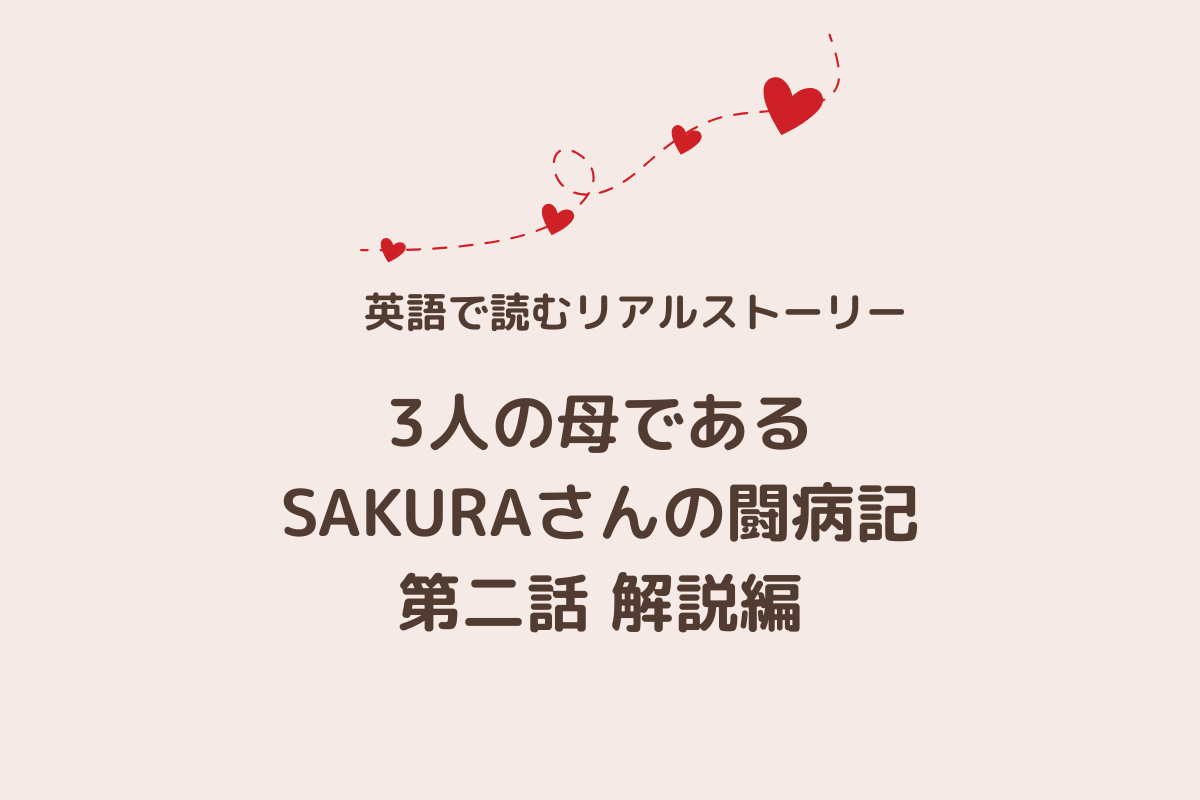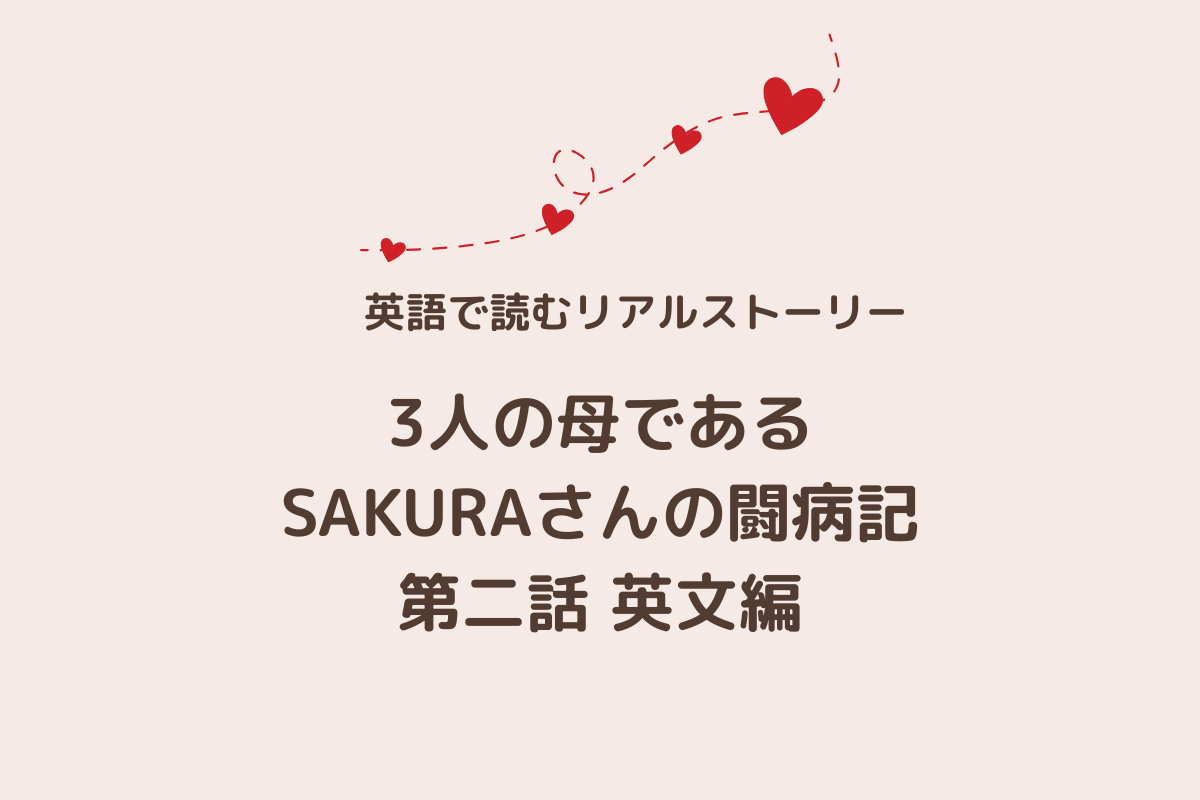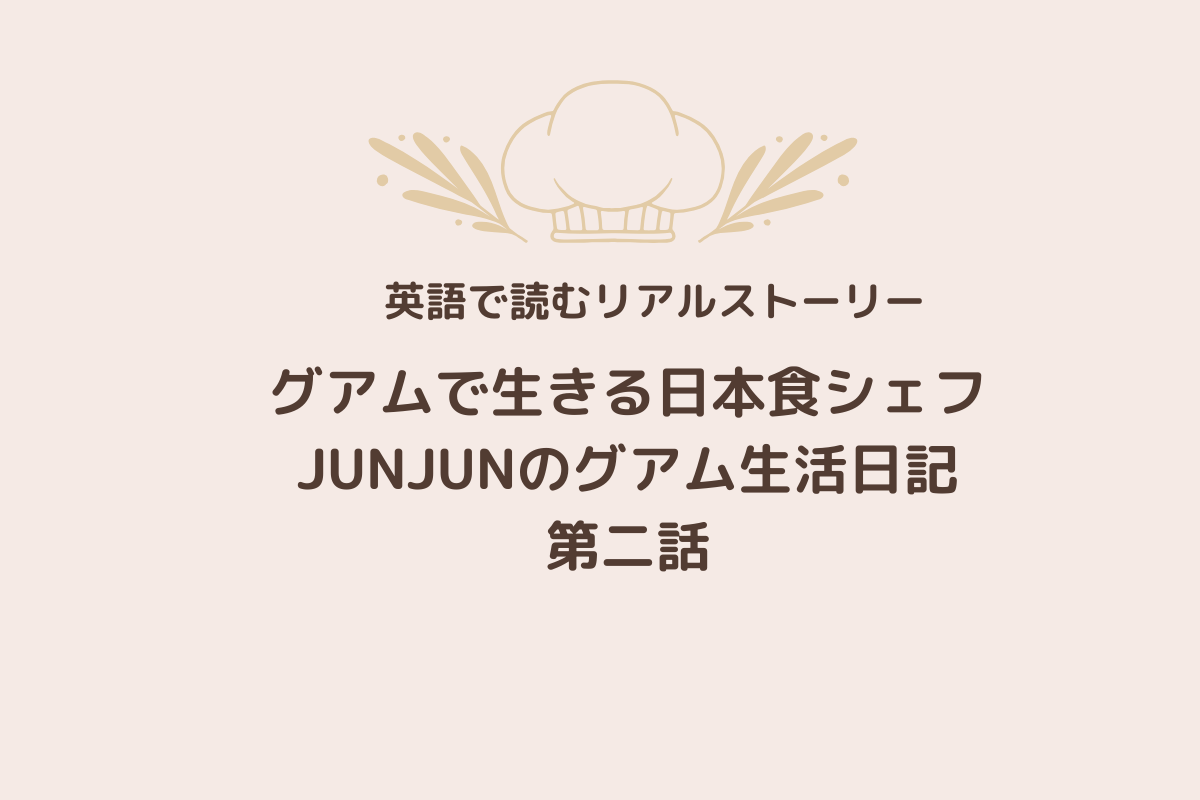SAKURAさんの英文の構成を解説しています。聞きなれない単語には注釈をつけているほか、「小さな意味のかたまり毎」に読む方法、全体の和訳や読解テストもつけているので、深く学びたい方はこちらをご覧ください。
最終的な目標は「英語を英語で理解する」ことなので英文から先に読んでくださいね。
チャンク毎の意味
「わからない部分があっても、そのまま英文を読み進めて大丈夫です。むしろその方が、「英語を英語のまま理解する力」が早く育つこともあります。
「それではまだほとんど意味がわからない」、「どうしても意味のわからない箇所が気になる」という場合は、英文をチャンク(小さな意味のかたまり)に区切って理解すると全体の意味がラクに掴めるようになります。
ただし、この時に「日本語の語順に直すことなく、英語の語順のままで意味を理解する」ようにしてください。これが英語をモノにする鍵となります。
なお、チャンク文や和訳は「必ず読むもの」ではありません。細かい分析がストレスになるようでしたら、無理に読まず、英文だけを楽しんでください。
つまり、英文以外を「読む」か「読まない」かは、あなたがより心地よく感じる方を自由に選べば良いのです。
❶
The sedative kept me asleep during the endoscopy.
→ 鎮静剤によって、内視鏡検査の間ずっと眠っていました。
- The sedative = 鎮静剤(眠くする薬)
- kept me asleep = 私を眠ったままにした(keep + 人 + 形容詞 = ~の状態にしておく)
- during the endoscopy = 内視鏡検査の間(during+名詞 = ~の間、 endoscopy = 内視鏡検査)
❷
I vaguely remember vomiting, and the doctor stepping back in surprise, slightly recoiling.
→ 吐いたことと、医師が驚いて少し後ずさりしたことをぼんやりと覚えています。
- I vaguely remember vomiting = 吐いたことをぼんやり覚えている(vaguely = かすかに、vomiting = 嘔吐)
- the doctor stepping back in surprise = 医師が驚いて後ずさる
- slightly recoiling = 少しのけぞる(recoil = 反動で引く、のけぞる)
❸
I hadn’t eaten anything since dinner the night before, so there should have been nothing to throw up.
→ 前日の夕食以来何も食べていなかったので、吐くものはないはずでした。
- I hadn’t eaten anything = 何も食べていなかった(過去完了)
- since dinner the night before = 前日の夕食以来
- there should have been nothing to throw up = 吐くものは何もなかったはず(should have + 過去分詞 = ~だったはず)
❹
The endoscopy showed no signs of cancer in my esophagus, stomach, or duodenum.
→ 内視鏡検査では、食道・胃・十二指腸にがんの兆候は見られませんでした。
- The endoscopy showed = 内視鏡検査でわかった
- no signs of cancer = がんの兆候はなかった
- in my esophagus, stomach, or duodenum = 食道、胃、または十二指腸に
❺
However, the duodenum was edematous and partially narrowed, with some food stuck there.
→ しかし、十二指腸はむくんでおり、部分的に狭くなっていて、食べ物が詰まっていました。
- the duodenum was edematous = 十二指腸がむくんでいた(edematous = むくんだ)
- and partially narrowed = 部分的に狭くなっていた
- with some food stuck there = 食べ物がそこで詰まっていた状態で
❻
The doctor said that the problem was likely outside the duodenum or in the jejunum.
→ 医師は、問題は十二指腸の外側、あるいは空腸にある可能性が高いと言いました。
- The doctor said that = 医師は~と言った
- the problem was likely = 問題はおそらく~だ(likely = 可能性が高い)
- outside the duodenum or in the jejunum = 十二指腸の外側か空腸に
❼
After the examination, a nurse said to me, “There was some udon left in your stomach.”
→ 検査の後、看護師が私に「胃の中にうどんが残っていました」と言いました。
- After the examination = 検査の後に
- a nurse said to me = 看護師が私に言った
- There was some udon left = うどんが残っていました
❽
Udon…? My blood ran cold as soon as I realized what she meant.
→ うどん…?彼女の言った意味がわかった時、私はゾッとしました。
- Udon…? = うどん…?(疑問と戸惑い)
- My blood ran cold = 血の気が引いた(恐怖や衝撃で)
- as soon as I realized what she meant = 彼女の言ったことの意味がわかった瞬間に
❾
It wasn’t udon, but the konjac pasta I had for lunch the day before!
→ それはうどんではなく、前日に昼食で食べたこんにゃくパスタだったのです!
- It wasn’t udon = それはうどんではなかった
- but (it was) the konjac pasta I had for lunch the day before = ししかし、それは前の日の昼に食べたこんにゃくパスタだった
※butのあとは 主語+動詞(It was) が省略されています。
❿
This meant that the konjac pasta I had eaten 21 hours earlier was still in my stomach.
→ つまり、21時間前に食べたこんにゃくパスタがまだ胃の中にあったということです。
- This meant that = これは~を意味していた
- the konjac pasta I had eaten 21 hours earlier = 私が21時間前に食べたこんにゃくパスタ
- was still in my stomach = まだ胃の中にあった
⓫
I was shocked—not because it hadn’t been digested (konjac is known for being resistant to digestion), but because it had remained in my stomach for so long without passing through.
→ 私がショックを受けたのは、それが消化されなかったからではなく(こんにゃくは消化されにくいことで知られています)、それほど長い間通過せずに胃に留まっていたからでした。
- I was shocked = 私はショックを受けた
- not because it hadn’t been digested = 消化されなかったからではなく(not because ~=~だからではなく)
- but because it had remained in my stomach = でもそれが胃に残っていたから(not because ~ but because…=~だからではなく…だからだ)
- without passing through = 通過せずに(pass through = 通過する)

読解確認テスト
❶ What happened during the endoscopy?
→ The writer vomited, and the doctor stepped back in surprise.
❷ Why was the writer surprised about the food in her stomach?
→ Because the food stayed in her stomach for a long time.
❸ What did the nurse say after the examination?
→ She said there was some udon left in the writer’s stomach.
❹ What did the writer actually eat the day before?
→ She ate konjac pasta for lunch.
❺ How did the writer feel after realizing the food stayed in her stomach?
→ She was shocked.



コメント